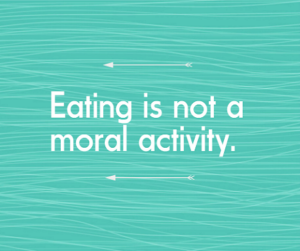3 Things The Wellness Industry Gets Wrong
Requests: 0
Views: 3
A few years ago, I thought that I had found the solution to the ever-persistent question, “How should I eat?” After stumbling across a few food blogs that advocated a simple, whole foods approach to eating, the answer became clear: there are healthy foods (unaltered, unprocessed and plant-based) and there are unhealthy foods (everything else).
It made sense to me, and I trusted this seemingly healthy and balanced way of eating to lead me to an increased sense of wellness. However, things are rarely this black and white. Linking food so closely to health can make every decision about what to eat agonizing. Gluten causes inflammation; meat consumption is linked to cancer—these warnings are everywhere we look.
Healthy eating has become a national obsession, a counter-attack on a food industry that has been blamed for increasing rates of diabetes, cancer and other health issues. And it goes beyond politics and science. Social media is filled with images of green smoothies and kale salads, alongside messages that tell us this is how to avoid sickness and achieve wellness.
 (Image courtesy of Proud2BMe)
And there’s the catch: this all-or-nothing thinking put forth by the so-called “wellness industry” is creating another type of unhealthy food relationship. In fact, taken to the extreme, it can even lead to orthorexia, characterized by an obsession with healthy eating [Ed note: orthorexia represents many symptoms associated with disordered eating, but it is not a recognized clinical diagnosis]. Of course, we cannot be totally blamed for our preoccupation with clean eats or the belief that these foods will lead to good health.
The food industry and social media are strong and persuasive forces, and it is easy to buy into claims made on a subject as contentious as nutrition. That being said, it is crucial that we begin to recognize and understand what the wellness industry gets wrong:
(Image courtesy of Proud2BMe)
And there’s the catch: this all-or-nothing thinking put forth by the so-called “wellness industry” is creating another type of unhealthy food relationship. In fact, taken to the extreme, it can even lead to orthorexia, characterized by an obsession with healthy eating [Ed note: orthorexia represents many symptoms associated with disordered eating, but it is not a recognized clinical diagnosis]. Of course, we cannot be totally blamed for our preoccupation with clean eats or the belief that these foods will lead to good health.
The food industry and social media are strong and persuasive forces, and it is easy to buy into claims made on a subject as contentious as nutrition. That being said, it is crucial that we begin to recognize and understand what the wellness industry gets wrong:
 (Image courtesy of Proud2BMe)
And there’s the catch: this all-or-nothing thinking put forth by the so-called “wellness industry” is creating another type of unhealthy food relationship. In fact, taken to the extreme, it can even lead to orthorexia, characterized by an obsession with healthy eating [Ed note: orthorexia represents many symptoms associated with disordered eating, but it is not a recognized clinical diagnosis]. Of course, we cannot be totally blamed for our preoccupation with clean eats or the belief that these foods will lead to good health.
The food industry and social media are strong and persuasive forces, and it is easy to buy into claims made on a subject as contentious as nutrition. That being said, it is crucial that we begin to recognize and understand what the wellness industry gets wrong:
(Image courtesy of Proud2BMe)
And there’s the catch: this all-or-nothing thinking put forth by the so-called “wellness industry” is creating another type of unhealthy food relationship. In fact, taken to the extreme, it can even lead to orthorexia, characterized by an obsession with healthy eating [Ed note: orthorexia represents many symptoms associated with disordered eating, but it is not a recognized clinical diagnosis]. Of course, we cannot be totally blamed for our preoccupation with clean eats or the belief that these foods will lead to good health.
The food industry and social media are strong and persuasive forces, and it is easy to buy into claims made on a subject as contentious as nutrition. That being said, it is crucial that we begin to recognize and understand what the wellness industry gets wrong:
1. Eating is not a moral activity.
When strict lines are drawn between “healthy” and “not healthy” foods, it becomes easy to assign value to these two camps. A quick scroll through Instagram reveals a flood of #cleaneating posts, and this kind of language implies that there is a right and a wrong way to eat. However, there is no such thing as a one-size-fits-all diet and how people choose to eat and nourish themselves is entirely up to the individual.2. Restriction is not self-care.
The preoccupation with “clean” foods stems from the belief that these foods provide the body with essential nutrients, while “other” foods cause a variety of adverse health symptoms. While, yes, it is true that some foods have different health properties than others, kale and chia seeds will not magically grant perfect health, just as pizza and ice cream will not immediately take it away. Rigidity leads to fear and takes away pleasure, which is just as nourishing as nutrients. To continue reading this article from our partner, Proud2BMe, click here.Reactions